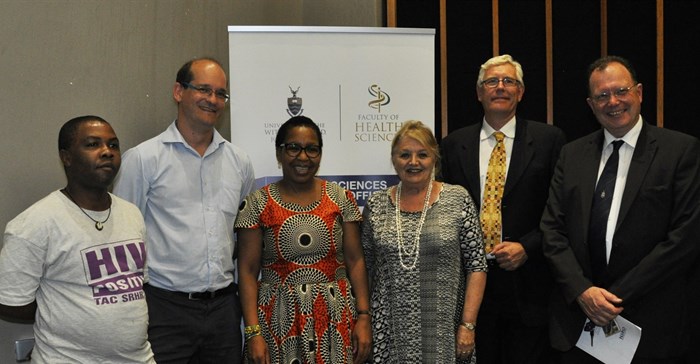
Professors Ian Sanne and Francois Venter presented a lecture ART: Do or Die - about the imperative to drive HIV/Aids research, treatment and accessibility. This is the ‘do’ part, because without this, patients would die – at the University of the Witwatersrand’s faculty of health sciences’ 14th Prestigious Research Lecture.
“While a cure for HIV/ids is not yet in sight, we know that treatment works. For the past 20 years we have been working on improving drugs, optimising adherence and making treatment accessible to all people living with HIV, including the 6m people in South Africa,” explains Sanne, who is the director of Wits’ clinical HIV research unit.
“New drugs such as dolutegravir and tenofovir alafenamide promise to make first line regimens safer and cheaper, if successful in clinical trials,” says Venter, deputy executive director of the Wits reproductive health and HIV institute.
“With pressure on HIV budgets limiting the transition to second and subsequent lines of therapy which are more toxic, harder to take, and more expensive, the advancement of first line drugs is a priority.”
Since 2003, the country’s department of health (DoH) has developed the largest HIV treatment programme in the world. Wits University has significantly contributed to this in a number of ways: from clinical research in the drug development of all ARV therapies registered worldwide, to implementation, outcomes and health economics evaluation. This works to ensure that Treasury and the department utilise the best possible treatment regimen to reduce morbidity and mortality.
“Life expectancy in patients successfully treated with ARV therapy is normalising and recent advances in HIV treatment have demonstrated that successful ARV treatment is associated with a reduction in population viral loads and HIV transmission,” explains Sanne.
“Treating everyone with HIV, as a mechanism to stop the spread of HIV, has been extensively mathematically modelled, with some observational evidence from KwaZulu-Natal that it works,” adds Venter.
“However, various African countries have not seen a decrease in incidence predicted by these models, and this is probably because of treatment being initiated too late and also due to inadequate patient care. New, creative ways to address the failure of HIV prevention efforts are being researched.” These include HIV self-testing kits, to get people to test earlier and start treatment early, long-acting, injectable preventive therapy, and interventions that promote greater medication adherence.
“We will soon be launching patient dispensing units (PDUs) at two pharmacies in Soweto, one in Diepsloot and one in Alexandra, together with the minister of health and the premier of Gauteng,” says Sanne. “How it works is that you present yourself with your ID, which the PDU reads, links to your records and dispenses your medicine in much the same way as you get cash from an ATM.”
In addition to ARVs, the PDUs will dispense a range of other prescription medicines for chronic conditions such as hypertension, diabetes and asthma. This way, people with HIV/Aids do not feel targeted when they withdraw their medication.
The pharmacies will be open from 6am to 10pm every day to make it easier for working people to access their medication outside of clinic hours, which will contribute to greater medication adherence. Sanne says they hope to have 200,000 patients using the launch units within a short period of time. The roll out of PDUs countrywide will follow.